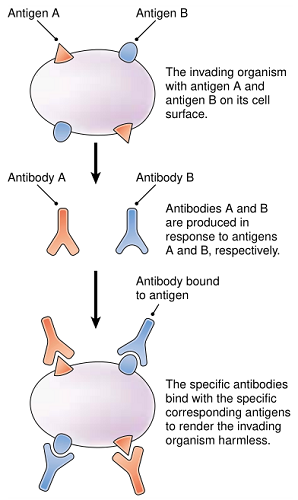Our bodies have an array of defenses against foreign matter. Some of these defenses are nonspecific, that is, they protect against any intruder. Such defenses include the unbroken skin, blood-filtering lymphoid tissue, cilia and mucus that trap foreign material, bactericidal body secretions, and reflexes such as coughing and sneezing.
Specific attacks on disease organisms are mounted by the immune system. The immune response involves complex interactions between components of the lymphatic system and the blood. Any foreign particle may act as an antigen, that is, a substance that provokes a response by the immune system. This response comes from two types of lymphocytes that circulate in the blood and lymphatic system. One type, the T cells (T lymphocytes), mature in the thymus gland. They are capable of attacking a foreign cell directly, producing cell-mediated immunity. Macrophages, descendants of monocytes, are important in the function of T cells.
Macrophages take in and process foreign antigens. A T cell is activated when it contacts an antigen on the surface of a macrophage in combination with some of the body's own proteins.
The B cells (B lymphocytes) mature in lymphoid tissue. When they meet a foreign antigen, they multiply rapidly, transforming into plasma cells. These cells produce antibodies, also called immunoglobulins (Ig), that inactivate an antigen (Fig.1). Antibodies remain in the blood, often providing long-term immunity to the specific organism against which they were formed. Antibody-based immunity is referred to as humoral immunity.

Fig.1. Antibodies are produced by cells of the immune system to bind with specific antigens.
责任编辑:admin
上一篇:Rosai-Dorfman Disease Presenting as a Parotid Mass
下一篇:医学文章阅读——Sources and Reservoirs of Infection

微信公众号搜索“译员”关注我们,每天为您推送翻译理论和技巧,外语学习及翻译招聘信息。